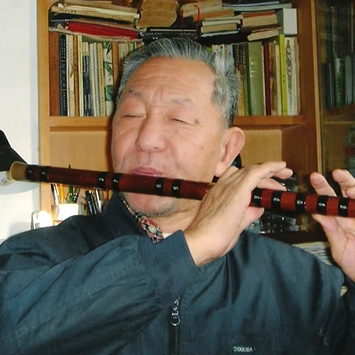King Hammer

Wang Tiechui, male, born in 1932, is a famous bamboo flute and flute player in China, and a master of the northern school of flute in China. Soloist of the Central Chinese Orchestra. National first-class actor, winner of special government allowance, member of China Musicians Association, director of Artists Association of the Ministry of Culture, executive director of the Central National Orchestra Society, director of Beijing Musical Instrument Popularization Association, Chinese Music Association Performing Arts Committee Ethnic Wind Music Beijing Deputy head of the research group and consultant of Shanghai No.1 National Musical Instrument Factory.
His performance is full of breath, skillful, mellow tone, distinct layers, and very infectious, and is known as the representative of China's northern school of flute.
Personal experience
Born into a family
Wang Tiechui was born in 1932 in Ziwei Village, Dingxian County, Hebei Province, the hometown of the Whispering Society. His father was a member of the Whispering Society. The background of his birth in the hometown of chirps and his ancestors’ six generations of playing amateur folk musical instruments made him influenced by folk music at an early age. Learn to play the flute and play music. Strict performance requirements laid a good foundation for him. He began to perform on stage at the age of ten, and was immediately warmly welcomed and loved by the masses. In 1947, he entered the College of Literature and Art of North China University with outstanding performance, and then worked in the band of the Huada Cultural and Art Troupe and the Central Song and Dance Ensemble.
Inheritance from famous teachers
In the process of Mr. Wang Tiechui's artistic growth, in addition to his personal research and experience, he is still grateful for the enthusiastic guidance and support of Lu Ji, Zhou Weizhi, Li Huanzhi, Li Ling, Shi Lemeng, Zhao Xi, Tang Rongmei and many other musicians of the older generation. Now that he has gone through a formal performance career for nearly a decade, he has faithfully and completely recorded his perfect flute skills with the accompaniment of China's largest comprehensive ethnic music group, the Central Chinese Orchestra, using the most advanced digital recording technology. . Under the still mellow and beautiful playing tone, what is presented is not only the best choice for a national music album, but also a national treasure-level artist after decades of experience, his rich music experience, life wisdom and calm and reserved The perfect combination of emotional expression and mature artistic style is a super-standard performance.
Learn from others
In addition to inheriting the foundation of folk music, he draws on the strengths of many families and strives to study the art of flute playing. After long-term performance practice, he gradually formed his own artistic style. He has a deep understanding of works and has unique interpretation skills for works in different regions and styles. He also paid special attention to sorting out the folk music of Caijie in various regions of the country, moderately adapting it into modern repertoire, in order to revitalize, expand and disseminate national music. He also spared no effort to popularize folk music. Not only did he enthusiastically guide amateur flute lovers during his tours around the world, he also took the time to hold performance lectures in various colleges and universities, and published in newspapers and magazines the musical and non-musical aspects related to the promotion of Chinese folk music. article.
main works
Over the years, Wang Tiechui has successively published books such as "Wang Tiezui Dizi Collection" and "Introduction to Dizi Playing", and has recorded "The Northern School Dizi Master Wang Tiechui Dizi Solo Collection" and "Wang Tiehui's Flute, Xiao, Bawu, Xun, Hulusi Performance Collection" Wait for the CD turntable. In addition, he also composed and adapted the flute tunes "Celebrating the Harvest", "On the Road" and "Morning in the Oil Field".
In more than 50 years of artistic practice, Wang Tiechui has carefully studied, learned from others, and formed his own artistic personality and style. In 1953, he won the prize at the Fourth World Youth Festival National Instrument Solo Competition. In 1955, he won the second prize for folk wind quartet and the third prize for flute solo at the Fifth World Youth Festival. He also accompanied the troupe to more than 20 countries including the United States, Britain, Germany, Japan, India, the former Soviet Union, etc. to visit and perform, and was warmly welcomed.
social activity
He has visited and performed abroad with Chinese music and art groups many times, and won awards in international music competitions. In addition to music, he has further improved his literacy in all aspects. In his youth, he was already a very active new star in the national music field. , and won the Dizi Solo Excellence Award at the 4th World Youth Festival in Bucharest in 1953, and the second prize and the third prize in the Dizi Solo Competition at the 5th World Youth Festival in Warsaw in 1955. He has toured in major cities, and has also visited India, Switzerland, Brazil, Chile, Uruguay, Argentina, Japan, the United Kingdom, Iraq, the United States, Tanzania and other countries, covering more than 20 countries in Asia, Africa, Europe and the United States. , not only to enhance cultural exchanges, but also to spread the seeds of Chinese classical music all over the world.
Similar artist
Involving musical instruments
Involved portfolio
Involved news
Popular artists
- 01 Zhang Xiuyan
- 02 Chen Tao
- 03 Li Muliang
- 04 Zhu Changyao
- 05 Zhang Gaoxiang
 渝公网安备 50010702504639号
渝公网安备 50010702504639号